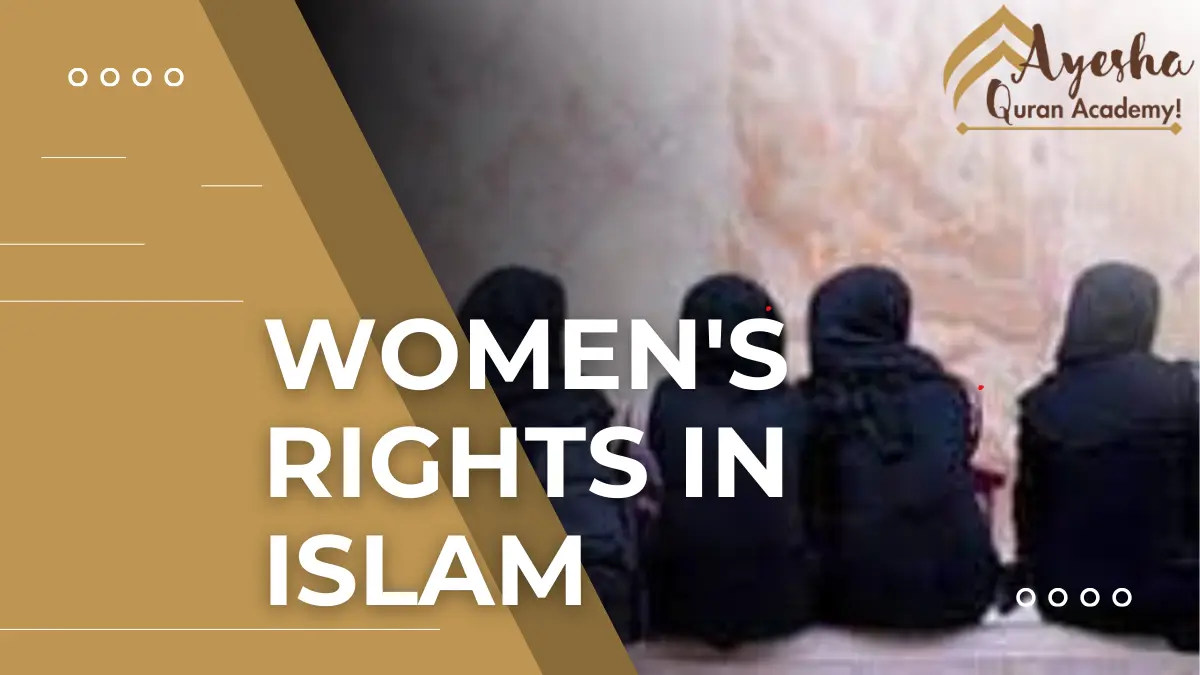Allah has made every woman beautiful in a unique way. Islam has taught every person about the vitality of gender equality. It has emphasized that no woman is lower in any case.
Islam is the religion of love and equality. But, due to current cultural and social notions, people began to wonder if Islam supports women’s rights at all.
In Islam, there is no difference in the rights of men and women as both of them are equal in the eye of Allah (سُبْحَانَهُ وَتَعَالَى).
Allah (سُبْحَانَهُ وَتَعَالَى) discriminates against people based on their deeds, and both will get some amount of love and punishment for their evil acts.
Women’s Rights in the Quran
Quran emphasizes:
“Women have rights similar to those of men…” (2:228)
The Prophet of Islam (ﷺ) says that women are the twin halves of men. It shows that the women and men are equal to each other. All the rights belonging to women are of importance.
Be it in the form of mother, daughter, sister, or wife, everyone has their importance in the life of men. Nonetheless, we can not deny that men have a sense of responsibility over women.
But it only indicates the natural entitlement of protection to women. It does not dictate any power or superiority of a husband over his wife.
Fatima was the favorite daughter of Islam as she was the most beloved daughter of the Prophet. She is the mother of Hasan and Hussain, as well as the wife of Ali ibn Abu Talib.
Fatima is the most merciful and has an impactful personality. The most influential women in the Islamic world are Maryam, Fatima, Asiya, and Khadijah.
We can understand the respect women get in Islam through this Hadith;
“Whenever she would enter upon the Prophet (ﷺ) he would stand to her and kiss her, and he would sit her in his sitting place.” (Jami` at-Tirmidhi 3872)
Importance of Daughters in Islam
In Islam, a woman can make her own decisions independently. She has her complete right over life.
She has permission to choose her career, her companion, or whatever she wants to do with her inheritance.
In the old times of the pre-Islamic era, people used to bury their daughters. They thought of females as a burden and dishonor. Hence, only wanted a son.
The Prophet (ﷺ) was entirely against this act as he hated this tradition. He showed that there will be a big fire in Hell for those who are against the birth of daughters and who do not support their daughters.
The Holy Quran also says that on the day of Judgement, the girls who were buried alive will be asked about their sins (for which they were buried).
And this will frighten their wrongdoers. And she will demand compensation for her blood. (81:8)
Rights of Women in Islam
Islam allows women to make decisions for themselves. Islam ensures the dignity and respect of women. In every aspect, Islam protects the role of women throughout the stages of their life.
- Every woman can bequest in her name and be able to make contracts on her own as a legal person.
- Every woman has the right to choose a profession of her own choice. She can start her own business. And she also has the right to give her property to anyone, upon her choice.
- Every woman can select her partner for marriage, whoever she wants to marry, but in an honorable way.
- Women, in every stage of their life, are the most respected and dignified people in Islam. Either she is a wife, a mother, a sister, or a daughter.
- In Islam, a mother has a highly esteemed position. Mother has a status higher than a father, and we can back this statement up with an authentic Hadith narrated by Abu Huraira (Sahih al-Bukhari 5971)
Islam regards men and women as equals. And it is only the discrimination of their physical ability that separates them. Men are responsible for providing nourishment and maintaining the family.
While women are responsible for managing the family and the children, they should focus on the upbringing of children, which contributes heavily to developing a prosperous and healthy society.
Right of Inheritance
In Islam, women have inheritance rights. Daughters have a special place in Islam.
Quran says;
“For men, there is a share in what their parents and close relatives leave, and for women, there is a share in what their parents and close relatives leave—whether it is little or much. These are obligatory shares.” (4:7)
Allah (سُبْحَانَهُ وَتَعَالَى) has stated the share of men and women. He has described how to distribute the inheritance fairly among the children.
He has also mentioned that whoever deprives an heir (be it a man or woman) or changes their part of the share will be punished.
“But whoever disobeys Allah and His Messenger and exceeds their limits will be cast into Hell, to stay there forever. And they will suffer a humiliating punishment.” (4:14)
Every parent should show gratitude and love towards their daughter. And while there are so many people around us who respect their daughters.
Unfortunately, there are still some people around who disregard the rights of women.
Right of Marriage
Islam gives freedom to every woman and daughter to choose their partner for life. If a daughter wishes to select her husband for marriage, there is no issue in this regard.
Parents should allow and support this act and make this marriage possible. Even after marriage, the wife has rights over her husband financially and physically.
Some rights include accommodation, food, and her basic needs, including spending.
rights of wife in islam
In the rich tapestry of Islamic teachings, the rights of women hold a central place. Islam, as a religion of compassion and justice, emphasizes the equitable treatment of both men and women.
The rights bestowed upon wives are not merely legal obligations; they reflect a profound respect for their dignity and autonomy. Financial rights, such as the dowry (mahr), ensure safety and honor.
Beyond finances, husbands must provide for their wives’ basic needs, treating them with kindness and recognizing their emotions.
Equality among co-wives is mandated, and protection from harm—both physical and emotional—is essential. In Islam, marriage is a partnership guided by mutual respect and shared responsibilities.
Right of Divorce
“Give women you wed their due dowries graciously.” (4:4) (Quran)
Mahr indicates the seriousness of a marriage in Islam. Islam specifies the amount of “Mahr” as a token of respect for the wives. And just like inheritance and marriage, women have the right to divorce after marriage.
Mahr is an essential right of women in Islam after they get married. She can collect her Mahr from her husband in any form, such as money, jewelry, or property.
If the husband fails to pay the Mahr and the right of dower is violated, he has to pay this at the time of divorce or before.
It will be considered a debt on the husband, which can be claimed by retaining his possession, refusing to live together, or a lawsuit.
Misconceptions Regarding Women’s Rights in Islam
Some folks misunderstand women’s rights in Islam. These folk believe that women are severely underrated and disrespected.
There are men who falsely believe that women deserve no respect and behave rudely or violently towards them. Indeed, Islam discredits this false belief.
It holds every woman in high esteem. Islam guarantees the rights of all women, whether a wife, mother, or daughter.
Another common misunderstanding is that men can marry four women at once. However, the addition to this premise is that men must also possess the capability to provide food, housing, fairness, and individual areas for each of their wives.
The last misconception is that women have no right to choose their partners. However, this is just a misconception.
In a Hadith narrated by Aisha: “I asked the Prophet, “O Allah’s Messenger (ﷺ)! Should the women be asked for their consent to their marriage?” He said, “Yes.” (Sahih al-Bukhari 6946)
Conclusion
This blog post encapsulates the beauty of Islam and how Islam has given every woman her rightful status and respect.
As followers of Islam, spreading its teachings is our duty. Emphasizing fairness for women is crucial.
Realizing the value of women’s rights and the penalties for breaching them is vital.
Learning more about our faith, we understand it is a religion promotion harmony, affection, and fairness.


